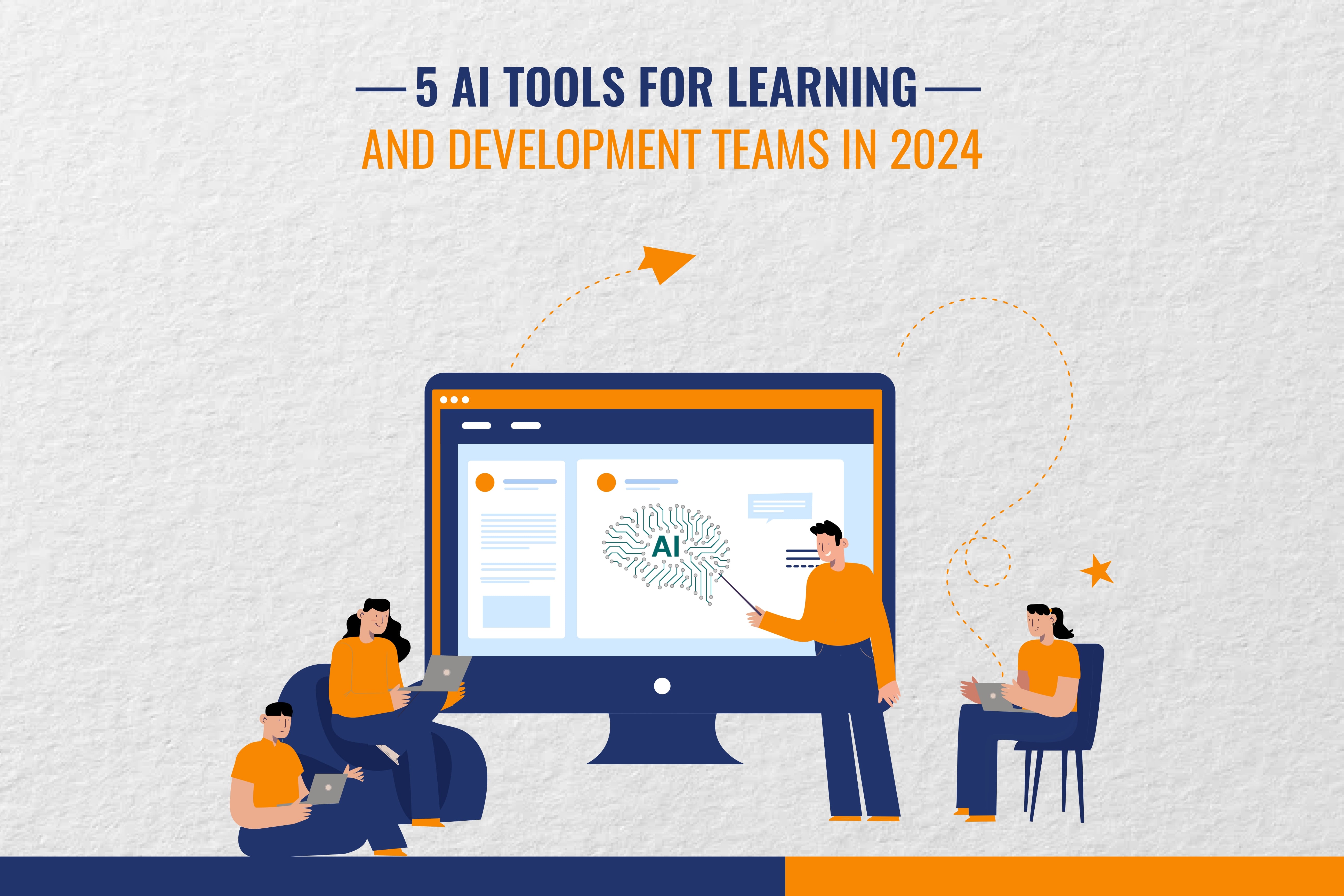
5 AI Tools For Learning and Development Teams In 2024
Wouldn’t you agree that staying ahead of the curve is paramount for businesses to remain competitive. This holds especially true for technical training programs within corporations, where the need for up-to-date knowledge and skill development is crucial. With the integration of Artificial Intelligence (AI) into learning and development initiatives, organizations can achieve greater efficiency, effectiveness, and innovation in their training endeavors.
Let us now learn about the five AI tools created to revolutionize corporate technical training in 2024. From personalized learning experiences to predictive analytics, these tools offer unparalleled opportunities for learning and development teams to elevate their programs and empower employees for success in an ever-changing digital world.
Adaptive Learning Platforms
Traditional one-size-fits-all technical training courses are becoming obsolete in the face of diverse learner needs and preferences. Adaptive learning platforms leverage AI algorithms to deliver personalized learning experiences tailored to individual learners' strengths, weaknesses, and learning styles. By analyzing data on learners' performance, engagement, and interactions, these platforms dynamically adjust course content, pacing, and assessments to optimize learning outcomes.
Key Features
Personalized Learning Paths: Adaptive algorithms generate customized learning paths based on learners' proficiency levels, preferences, and goals.
Real-time Feedback and Remediation: AI-powered assessments provide immediate feedback and offer targeted remediation to address learners' misconceptions or knowledge gaps.
Data-driven Insights: Learning analytics tools offer actionable insights into learners' progress, allowing instructors to make data-driven decisions for continuous improvement.
2. Virtual Reality (VR) Simulations
Immersive technologies like Virtual Reality (VR) have emerged as powerful tools for experiential learning in technical training programs. VR simulations enable learners to engage in realistic, hands-on experiences in a risk-free virtual environment, facilitating active learning and skill mastery. From complex equipment operation to hazardous scenario training, VR simulations offer a safe and cost-effective means of providing immersive learning experiences that mimic real-world situations.
Key Features
Interactive Learning Environments: Learners can explore and interact with virtual environments, equipment, and scenarios, fostering experiential learning and skill acquisition.
Scenario-based Training: VR simulations allow learners to practice problem-solving and decision-making in simulated real-world scenarios, enhancing critical thinking and situational awareness.
Performance Tracking and Assessment: AI analytics track learners' actions and performance within VR simulations, providing valuable insights for performance evaluation and competency assessment.
3. Chatbots for Instant Support and Learning Assistance
Incorporating chatbots into technical training courses can streamline the learning process and provide instant support to learners whenever they need it. Powered by Natural Language Processing (NLP) algorithms, chatbots can answer learners' questions, provide clarifications, and offer guidance in real-time.
Whether it's troubleshooting technical issues or seeking clarification on course content, chatbots offer a convenient and accessible means of support, reducing reliance on human instructors and fostering independent learning.
Key Features
24/7 Accessibility: Chatbots are available round-the-clock to assist learners, providing instant responses to queries and requests for assistance.
Personalized Recommendations: AI-driven chatbots analyze learners' interactions and preferences to offer personalized recommendations for additional resources, tutorials, or learning materials.
Continuous Improvement: Chatbots learn from their interactions with users, continuously improving their responses and knowledge base over time through machine learning algorithms.
4. Predictive Analytics for Learning Outcomes
Predictive analytics harness the power of AI to forecast learning outcomes and identify factors that contribute to learners' success or challenges. By analyzing vast datasets comprising learner demographics, engagement metrics, and performance indicators through corporate technical training, predictive analytics tools can anticipate learners' future performance, retention rates, and learning preferences. Armed with these insights, learning and development teams can proactively address potential barriers to learning success and optimize course design for maximum effectiveness.
Key Features
Early Intervention: Predictive analytics identify at-risk learners and potential roadblocks to learning success, enabling timely interventions and support strategies.
Course Optimization: By analyzing learner data and feedback, predictive analytics inform iterative improvements to course content, delivery methods, and assessment strategies.
Talent Development Strategies: Predictive analytics help organizations identify high-potential employees and tailor talent development initiatives to nurture their skills and capabilities effectively.
5. AI-Powered Content Creation and Curation
Creating and curating high-quality learning content can be a time-consuming and resource-intensive endeavor for learning and development teams. AI-powered content creation and curation tools streamline this process by automating tasks such as content generation, curation, and customization. Natural Language Generation (NLG) algorithms can produce engaging written content, instructional materials, and assessments, while content curation algorithms sift through vast repositories of educational resources to recommend the most relevant and impactful content for learners.
Key Features
Scalable Content Creation: AI-generated content can be rapidly scaled to meet the diverse learning needs of large cohorts of learners, ensuring consistency and quality across training programs.
Content Personalization: AI algorithms analyze learners' profiles, preferences, and performance data to tailor content recommendations and customization, enhancing relevance and engagement.
Content Quality Assurance: AI tools can evaluate the quality, relevance, and credibility of educational content, helping learning and development teams curate materials that meet rigorous standards and learning objectives.
Final Thoughts
As organizations strive to equip their workforce with the knowledge and skills needed to thrive in today's digital economy, leveraging AI tools for technical training programs is no longer a luxury but a strategic imperative. By embracing adaptive learning platforms, VR simulations, chatbots, predictive analytics, and AI-powered content creation tools, learning and development teams can deliver dynamic, personalized, and impactful training experiences that empower employees to excel in their roles and drive organizational success in 2024 and beyond. As we continue to witness advancements in AI technology, the future of corporate technical training holds immense promise for innovation, efficiency, and continuous learning.
